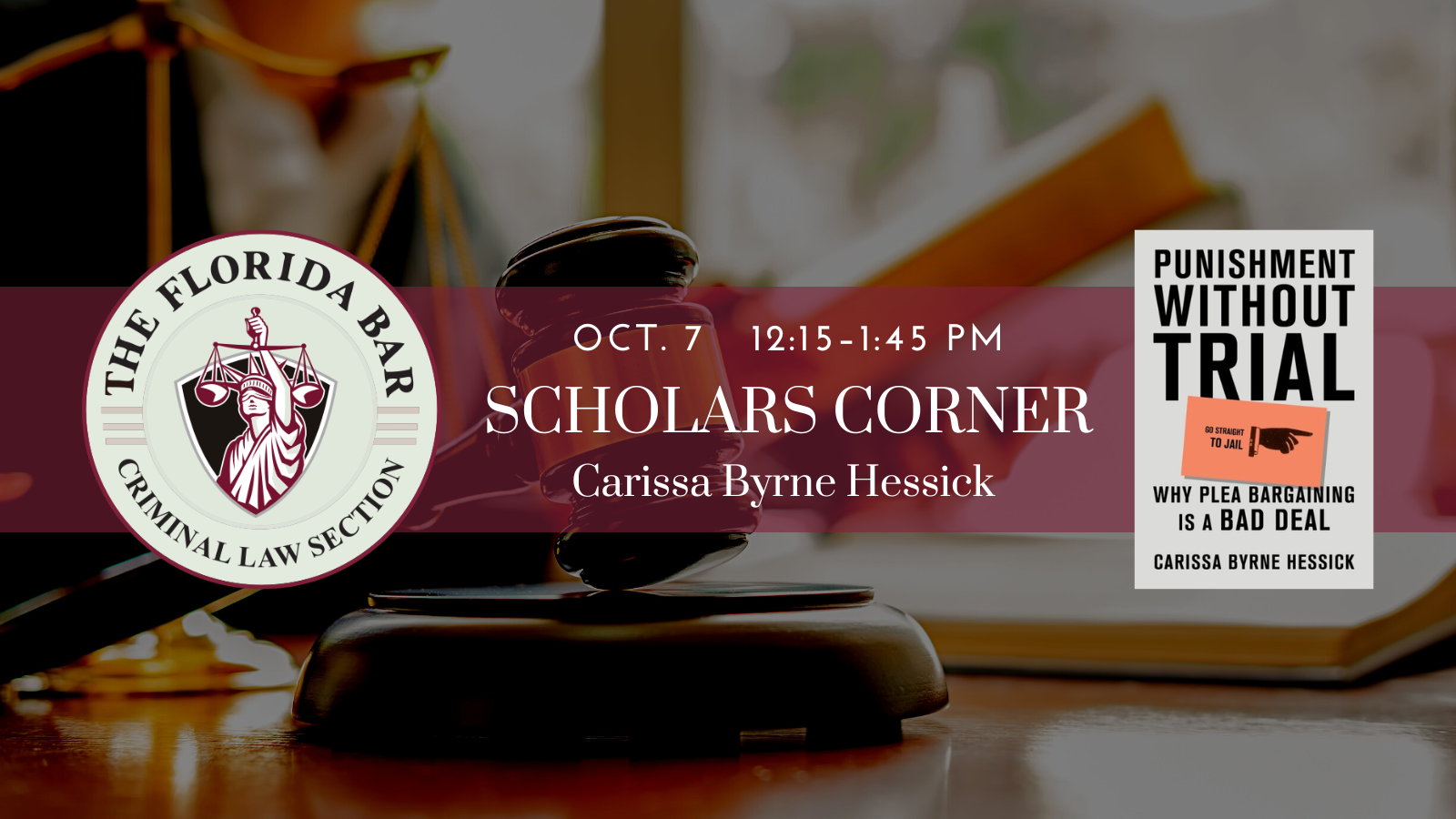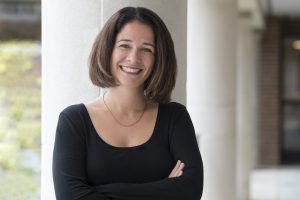

7 October, 2022 @ 12:15 pm - 1:45 pm
| Free for CLS MembersPunishment Without Trial: Why Plea Bargaining is a Bad Deal—October 7, 12:15–1:45 PM—Free CLE for Criminal Law Section members. Live on Zoom. Presented by Carissa Byrne Hessick, Director, Prosecutors and Politics Project; Anne Shea Ransdell and William Garland “Buck” Ransdell, Jr. Distinguished Professor Law, UNC School of Law, Chapel Hill, NC, and moderated by H. Scott Fingerhut. Course classification: Intermediate. Course number 6515 is approved for 2 General CLE credits and 2 certification credits each in Appellate Practice, Criminal Trial Law, Criminal Appellate Law, and Juvenile Law.
Scholars Corner is a CLE series presented by the Criminal Law Section bringing you legal experts and educators from across the country to discuss their latest work and speak with us about matters that are critical to our delivering better, fairer justice for all.
“This book is a must-read for anyone who wants to tackle mass incarceration, by one of the country’s most thoughtful scholars.” ~ Rachel E. Barkow, author of Prisoners of Politics: Breaking the Cycle of Mass Incarceration
The Criminal Law Section is privileged to welcome Professor Carissa Byrne Hessick to Scholars Corner to discuss her latest book, Punishment Without Trial: Why Plea Bargaining is a Bad Deal (Abrams Books, 2021), which has been called “a provocative and timely exploration of how plea bargaining prevents true criminal justice reform and how we can fix it.”
From the publisher’s site: “When most Americans think of the criminal justice system, the image that comes to mind is a trial—a standard courtroom scene with a defendant, attorneys, a judge, and most important, a jury. It’s a fair assumption. The right to a trial by jury is enshrined in both the body of the U.S. Constitution and the Bill of Rights. It’s supposed to be the foundation that undergirds our entire justice system.
“In Punishment Without Trial, Professor Hessick shows that the popular conception of a jury trial couldn’t be further from reality. That bedrock constitutional right has all but disappeared thanks to the unstoppable march of plea bargaining, which began to take hold during Prohibition and has skyrocketed since 1971, when it was affirmed as constitutional by the Supreme Court.
“Nearly every aspect of our criminal justice system encourages defendants—whether they’re innocent or guilty—to take a plea deal. Punishment Without Trial showcases how plea bargaining has undermined justice at every turn and across socioeconomic and racial divides. It forces the hands of lawyers, and defendants, turning our legal system into a ruthlessly efficient mass incarceration machine that is clogging our jails and punishing citizens because it’s the path of least resistance.
“Professor Hessick makes the case against plea bargaining as she illustrates how it has damaged our justice system while presenting an innovative set of reforms for how we can fix it.
“Punishment Without Trial will change the way you view the criminal justice system.”

Carissa Byrne Hessick joined the Carolina Law faculty in 2016. She serves as the Anne Shea Ransdell and William Garland “Buck” Ransdell, Jr. Distinguished Professor of Law and as the director of the Prosecutors and Politics Project. Her teaching and research interests include criminal law, the structure of the criminal justice system, criminal sentencing, and child pornography crimes. Hessick is the author of multiple law review articles, essays, and op-eds on plea bargaining, the powers and selection of prosecutors, Sixth Amendment sentencing rights, and criminal statutes. Her work has appeared in the California Law Review, the Cornell Law Review, the L.A. Times, the UCLA Law Review, and the Virginia Law Review, among others. She founded the Prosecutors and Politics Project in 2018. And she currently serves as the Reporter for the ABA Criminal Justice Section’s Sentencing Standards Task Force.
Hessick attended Yale Law School, where she was an editor of the Yale Law Journal and winner of the Potter Stewart Prize for the Morris Tyler Moot Court of Appeals. After graduating from law school, she clerked for Judge Barbara S. Jones on the Southern District of New York and for Judge A. Raymond Randolph on the D.C. Circuit. She also worked as a litigation associate at Wachtell, Lipton, Rosen & Katz in New York City. Before joining the faculty at Carolina Law, Hessick taught on the faculties at Arizona State University’s Sandra Day O’Connor College of Law and the University of Utah’s S.J. Quinney College of Law. She also spent two years as a Climenko Fellow at Harvard Law School.
Save the dates
